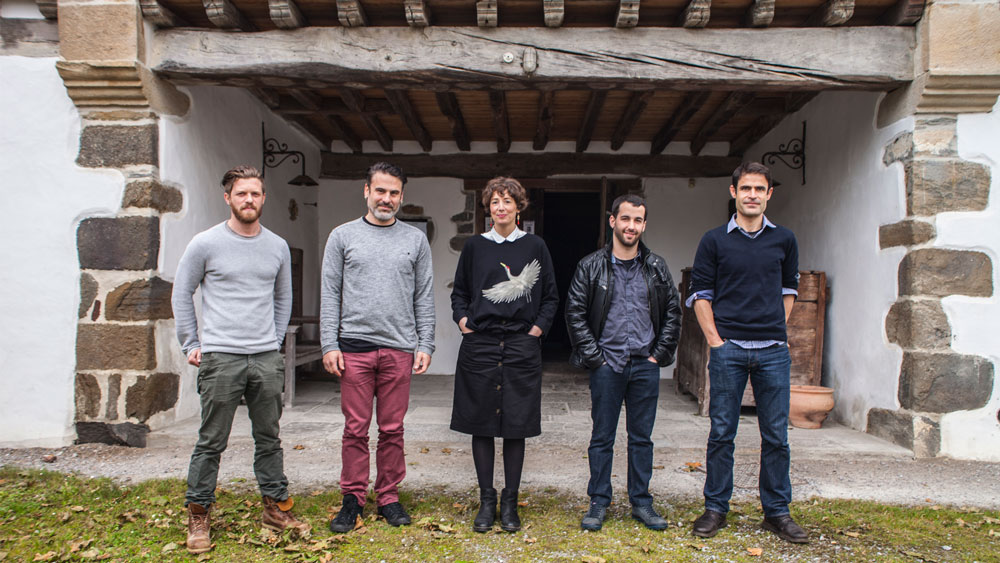
- The young Katti Pochelu is a worker of the new company created for the production and distribution of Basque films, Gastibeltza Filmak. The new structure was presented last May and since then they have been immersed in the office at Senpere: “At least in that sense we are not poor, we have work,” he laughs. We have talked with the Hazpandarra feat about Basque cinema, about the current situation and about the cultural reality it wants for the future.

He has long been working on the organization of the Zinegin festival.
I approached as a viewer at first. Then I liked it, it was a nice act for the cinema and as in Ipar Euskal Herria we did not have the opportunity to see Basque cinema, I cared to carry it forward. I saw Basque films, but not as much as I wanted and every time I had to go to San Sebastian, Irun or another film. So I entered the Eihartu society, which is organizing. On the other hand, having gone through Hazparne, furibundo, I was happy to be near me.
What makes a good movie for you?
I love movies that I'm excited about, but for different reasons, I can get excited by a movie. I don't know too much, I'm open to different styles. I think I'm also excited by different things, depending on humor and the day.
Gastibeltza The films are now in the structure. In Ipar Euskal Herria you would also like to see a film policy.
We are trying to push this policy forward. We want film to develop from here, we want a small film economy to be built, we want technicians to be trained here -- all so we don't have to go outside here. It is feasible, but that is in the hands of politicians and it is up to them to make the decision.
What would you say to a position when it comes to convincing
him?The debate is always whether culture brings something to a territory or not. Those of us who work in culture are clear: it brings a dynamic to the territory, it creates jobs, it brings money, because people move in the same place, because we work with local companies ... In addition, culturally it is the way to bring reality from here to the outside, which also convinces us. It is easy to see a film in any country, for which help and whims are needed, but in fact, Basque films can be taken to Paris, to a Romanian city or to a small Polish people.

How's the Gastibeltza Film?
We're still doing everything in shape. On the one hand, we are organizing our structure, on the other hand, giving and moving participations in the plan. We are talking about institutions throughout the Basque Country, about a policy to think about both sides and about something that can link the two. We're also chafing about projects. Two co-productions (Jainkoak ez dit barkatzen and Céoroitzapenak) that we have presented have been successfully selected at the San Sebastian Film Festival. We're also working as a co-producer in another documentary, and we're moving on, and now we're starting with new projects. From Hego Euskal Herria we also have proposals to make productions, to distribute films... At least in this respect we are not poor, we have work! [laughter] It's true that we have a lot of illusion, because since we introduced the project, we have a very good reception.
In the Northern and Southern Basque Country.
Yes, because here people see that a dynamic is being created. We're not the only ones or the first ones, there were others, but look, development goes on. In Hego Euskal Herria as well, because they affirm that in the end in Ipar Euskal Herria, things also begin to move and they see a new contestant that helps them in the production and distribution of their films.
Why is it so rare to find a Basque film in Iparralde cinemas?
I think it's mostly linked to ignorance or ignorance. The cinemas here are not necessarily close to Basque culture, they are not used to watch movies in Basque. Distribution is an experience, but one or two films are proposed a year, very few. Our aim is to disseminate the proposal, to show the diversity that exists in Basque cinema. We know that there is audience for Basque film, the experience of Zinegin has taught us, we have seen other films fill rooms. We need to go and look for that audience. The programmes ensure that Basque cinema is going to become a classic of Basque cinema.
I heard him say that you are looking for the normalization of Basque cinema.
Yes, it's a normal date. When we take a schedule, we have Spanish, American, Romanian films, some South American films with a small preamble -- that's what we're used to. The same can be done with Basque cinema, but we lack that smell.
In Ipar Euskal Herria you have not chosen the easiest place.
We have to start somewhere, we know that it can be done here too, and that is what we are trying to do. We want to use this limitation, making it once and for all usable: for production, for seeking funding in France and in the Northern Basque Country, and for those from the south to pick up those from Hegoalde and Spain to make a co-production. Also from the point of view of the development of distribution, it would be more difficult to do so from Hego Euskal Herria.
“Herrian, baina biziki guti, oraindik hastapenean gara, ez da batere garatua. Bistan da hemengo erakundeek beharko dute goiz ala berant –goiz espero dut– haien esku hartu zinema politikaren garapena. Frantziari doakionez, zinemagintza gehiena Parisen da eta sektorea eskualdeka antolatua izanki, gu Akitania Berrian kokatuak gara, beraz Bordelen da gehiena gertatzen. Zinema politikarik ez dugunez hemen, ez da gauza askorik gertatzen”.